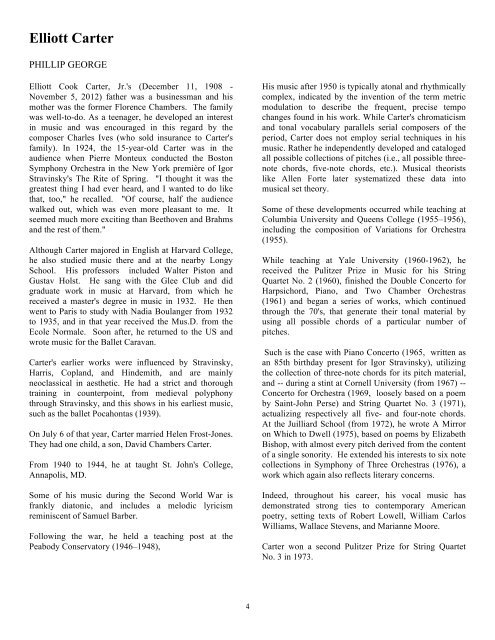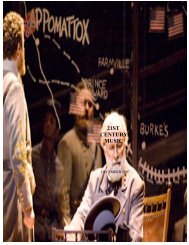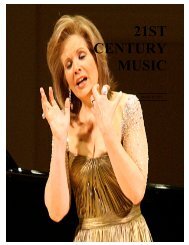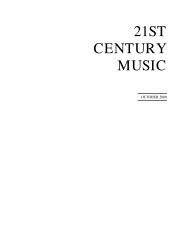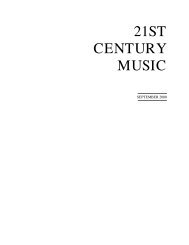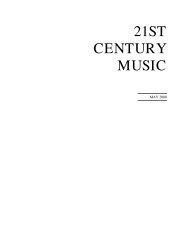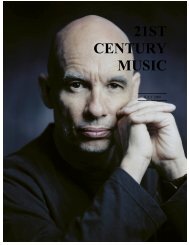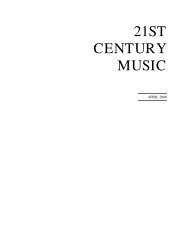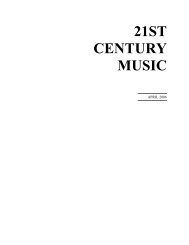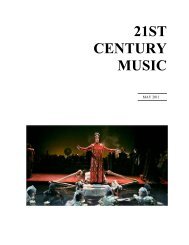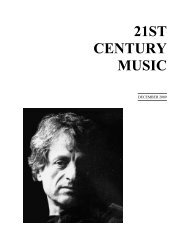You also want an ePaper? Increase the reach of your titles
YUMPU automatically turns print PDFs into web optimized ePapers that Google loves.
Elliott CarterPHILLIP GEORGEElliott Cook Carter, Jr.'s (December 11, 1908 -November 5, 2012) father was a businessman and hismother was the former Florence Chambers. The familywas well-to-do. As a teenager, he developed an interestin music and was encouraged in this regard by thecomposer Charles Ives (who sold insurance to Carter'sfamily). In 1924, the 15-year-old Carter was in theaudience when Pierre Monteux conducted the BostonSymphony Orchestra in the New York première of IgorStravinsky's The Rite of Spring. "I thought it was thegreatest thing I had ever heard, and I wanted to do likethat, too," he recalled. "Of course, half the audiencewalked out, which was even more pleasant to me. Itseemed much more exciting than Beethoven and Brahmsand the rest of them."Although Carter majored in English at Harvard College,he also studied music there and at the nearby LongySchool. His professors included Walter Piston andGustav Holst. He sang with the Glee Club and didgraduate work in music at Harvard, from which hereceived a master's degree in music in 1932. He thenwent to Paris to study with Nadia Boulanger from 1932to 1935, and in that year received the Mus.D. from theEcole Normale. Soon after, he returned to the US andwrote music for the Ballet Caravan.Carter's earlier works were influenced by Stravinsky,Harris, Copland, and Hindemith, and are mainlyneoclassical in aesthetic. He had a strict and thoroughtraining in counterpoint, from medieval polyphonythrough Stravinsky, and this shows in his earliest music,such as the ballet Pocahontas (1939).On July 6 of that year, Carter married Helen Frost-Jones.They had one child, a son, David Chambers Carter.From 1940 to 1944, he at taught St. John's College,Annapolis, MD.Some of his music during the Second World War isfrankly diatonic, and includes a melodic lyricismreminiscent of Samuel Barber.Following the war, he held a teaching post at thePeabody Conservatory (1946–1948),His music after 1950 is typically atonal and rhythmicallycomplex, indicated by the invention of the term metricmodulation to describe the frequent, precise tempochanges found in his work. While Carter's chromaticismand tonal vocabulary parallels serial composers of theperiod, Carter does not employ serial techniques in hismusic. Rather he independently developed and catalogedall possible collections of pitches (i.e., all possible threenotechords, five-note chords, etc.). <strong>Music</strong>al theoristslike Allen Forte later systematized these data intomusical set theory.Some of these developments occurred while teaching atColumbia University and Queens College (1955–1956),including the composition of Variations for Orchestra(1955).While teaching at Yale University (1960-1962), hereceived the Pulitzer Prize in <strong>Music</strong> for his StringQuartet No. 2 (1960), finished the Double Concerto forHarpsichord, Piano, and Two Chamber Orchestras(1961) and began a series of works, which continuedthrough the 70's, that generate their tonal material byusing all possible chords of a particular number ofpitches.Such is the case with Piano Concerto (1965, written asan 85th birthday present for Igor Stravinsky), utilizingthe collection of three-note chords for its pitch material,and -- during a stint at Cornell University (from 1967) --Concerto for Orchestra (1969, loosely based on a poemby Saint-John Perse) and String Quartet No. 3 (1971),actualizing respectively all five- and four-note chords.At the Juilliard School (from 1972), he wrote A Mirroron Which to Dwell (1975), based on poems by ElizabethBishop, with almost every pitch derived from the contentof a single sonority. He extended his interests to six notecollections in Symphony of Three Orchestras (1976), awork which again also reflects literary concerns.Indeed, throughout his career, his vocal music hasdemonstrated strong ties to contemporary Americanpoetry, setting texts of Robert Lowell, William CarlosWilliams, Wallace Stevens, and Marianne Moore.Carter won a second Pulitzer Prize for String QuartetNo. 3 in 1973.4


